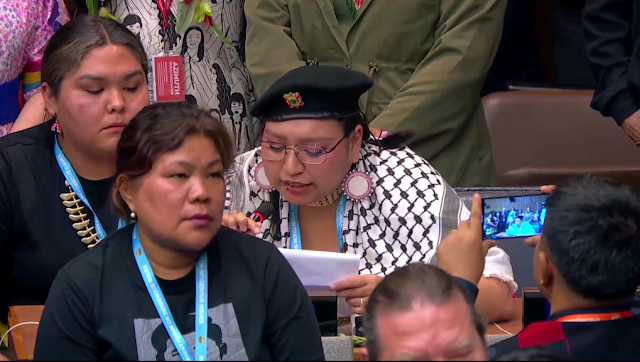CENSORED NEWS
April 18, 2024
Now -- Wowaglake MMIW and MMIP 2024 Conference Rapid City, South Dakota
April 17, 2024
Warriors for a New Generation: Indigenous Youths at the U.N. Permanent Forum on Indigenous Issues
 |
| Morgan Brings Plenty, Cheyenne River Lakota. Screenshot by Censored News. |
Blood Memories: Indigenous Women on the Frontlines Empower with Words and Action
 |
| Dr. Michelle Cook, Dine', human rights lawyer and founder of Divest Invest Protect, speaks on divestment and a just transition during the first of two panels on Wednesday evening. |
 |
| Casey Camp-Horinek, Ponca, human rights defender. https://www.facebook.com/watch/live/?ref=watch_permalink&v=1397554700910117 |
April 16, 2024
Federal Judge Denies Restraining Order Filed Against Interior Sec. Deb Haaland by Tohono O'odham and San Carlos Apache Nations
Construction equipment at the site of work in the San Pedro Valley for the SunZia Southwest Transmission Project is shown on Oct. 29. Alex Binford-Walsh of Archaeology Southwest
Breaking News: Federal Judge Denies Restraining Order Filed Against Interior Sec. Deb Haaland
By Brenda Norrell, Censored News, April 17, 2024
TUCSON -- A federal judge in Tucson denied a restraining order sought against Interior Sec. Deb Haaland by the Tohono O'odham and San Carlos Apache Nations. Haaland is pushing another fake "green energy" project, and bulldozers are ripping through ancient sites, ceremonial places, and medicine gathering places, for transmission lines to take wind energy from New Mexico to California.
Federal Judge Jennifer Zipps denied an injunction to stop work on the SunZia transmission line. Zipps ruled on Tuesday that the tribes and others filing the lawsuit waited too long to file, and the Interior and BLM had fulfilled their obligations to prepare inventory and identify cultural resources.
April 15, 2024
Indigenous Youths Lead at U.N. Permanent Forum on Indigenous Issues in New York
 |
Anpo Jensen, Kiyuksa Tiospaye, Oglala Lakota of Pine Ridge, South Dakota, delivered the statement of the Global Indigenous Youth Caucus to the U.N. Permanent Forum on Indigenous Issues. |





